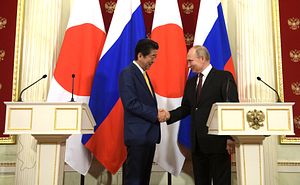On Tuesday, Russian President Vladimir Putin met Japanese Prime Minister Shinzo Abe in Moscow to discuss, among other issues, the resolution of a longstanding territorial dispute over the status of the Kuril Islands—what Japan calls the northern territories. Russia administers the islands, which are claimed by Japan.
The two sides remain far away from a resolution, despite the appearance of newfound momentum last autumn when Putin offered to resolve the issue by way of a peace treaty. The specific contours of that treaty have been difficult to nail down as there is little overlap still between what Tokyo might accept and what Russia would tolerate.
Beyond sovereignty concerns, the Russian side continues to see the Kuril Islands in highly securitized terms. The four disputed islands, which mark the westernmost links along the Kuril chain on the southern end of the Sea of Okhotsk, have strategic value for Moscow.
Furthermore, Japan, as a U.S. treaty ally, has maintained a right to allow the stationing of U.S. forces and assets on its territory as it sees fight within the alliance framework. For Russia, the possibility of U.S. forces or assets ending up on the Kuril Islands—posing a possible threat to the activities of the Russian Pacific Fleet in the Sea of Okhotsk—is unacceptable.
“Ahead of us lies painstaking work to create the conditions for us to arrive at a mutually-acceptable solution,” Putin said after his meeting with Abe. The meeting followed the release of a U.S. Missile Defense Review, which emphasized concerns about Russia. Another Russian concern over a possible transfer of the Kurils is specifically that Japan may allow the stationing of missile defense interceptors or sensors on these territories.
Meanwhile, after their meeting on Tuesday, Putin gave a nod to the issue of Russian public opinion around a possible resolution of the longstanding dispute, saying that a territorial handover would require the backing of the public. An overwhelming majority of Russians continue to oppose a handover of the territories.
For Abe, the Kuril Islands dispute has been an important priority throughout his prime ministerial terms. The resolution of the dispute would be a historic achievement for Japan, if he secures a framework for the handover of the islands. Japan’s proposal has been to offer a peace treaty for an immediate handover of two of the four disputed islands, leaving the fate of the final two islands as a matter to be decided between the two sides in the future.
Russia’s response to this proposal has been to demand that Japan first recognize Russian sovereignty over all four disputed islands as one of the outcomes of the Second World War. The basis for Japan’s position is the 1956 joint declaration between it and the Soviet Union, which outlines a plan to transfer two of the islands after the conclusion of a peace treaty between the two countries. That peace treaty has never been concluded and is the subject of current negotiations.
The resolution of the dispute is also seen in Japan as an opportunity to better align Tokyo and Moscow politically and economically, reducing the appeal of Chinese investment in Russia. While Russia and China see increasing alignment on global issues, Moscow has apprehensions about Chinese economic influence in its far eastern territories.

































